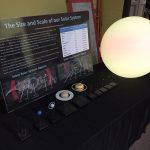Published December, 2018 Reflector, Vol. 71, No. 1
Astronomy may not be my primary career, but it is indeed a passion. It is something that I have enjoyed since my first real exposure to it as a Boy Scout. Volunteering to be the new editor for Reflector is just one of several things that I do to make sure that I continue to have a regular and healthy dose of astronomy in my life. Making the transition from observing the night sky, alone and in the dark, to joining the bright and public astronomical community is only something that I have only recently done. Doing so has exposed me to the experiences and challenges of others who share this passion. When I think about my journey from Boy Scout to editor, I realize that I am fortunate. And I have also realized that others may not have been as fortunate as I have been.
I never received much encouragement to explore and pursue astronomy, but I also did not need it. I had a natural passion and curiosity fueling my motivation to pursue it. While I might not have been encouraged to enjoy astronomy, I was never discouraged from doing it. And I believe that this is an important factor for many people when making personal or career choices
Throughout my 26-year career in information technology, I have observed the impact that biases and discouragement can have. Discouragement can be overt and direct, but itis most often subtle and perhaps even subconscious. Personal biases may lead to a forgotten meeting invitation, lack of inclusion in group selection, or missed recognition for a job well done. A bias may influence decisions for advancement, assignment, or belief in the validity of work that is being done. All of these biases can lead to discouragement. It has become obvious to me that these biases plague the astronomical fields as well.
A recent article published by Nature features strong anecdotal evidence supporting findings that women with
I do believe that there is observable hope within the next generation. Inclusion and awareness of biases seem to be on their radar. In a recent Nielsen study, the Millennial generation expresses more optimism that women will have equal consideration in the workforce, and also reports that the elimination of gender roles is the key factor (“Want More, Be More: When It Comes To Gender Equality, Millennial Women Are More Optimistic About Closing The Gap,” 2017). When it comes to defocusing on gender and focusing on abilities and talents, we can learn a lot from them. If the universe had a consciousness, I am sure that it would not consider the gender, age, or skin color of those living on the pale blue dot in the arguably average galaxy of those that want to study it. We shouldn’t either.
References
Want More, Be More: When It Comes To Gender Equality, Millennial Women Are More Optimistic About Closing The Gap. (2017, March 38). Retrieved from https://www.nielsen.com/us/en/insights/news/2017/when-it-comes-to-gender-equality-millennial-women-are-more-optimistic-on-closing-the-pay-gap.html.
Zastrow, M. (2018, October 15). Astronomy is losing women three times faster than men. Retrieved from https://www.nature.com/articles/d41586-018-07018-4?linkId=58212769.


